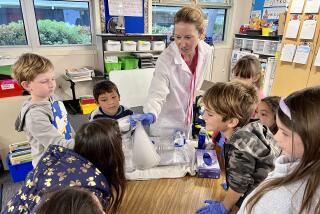Upgrading of Science Education Planned
- Share via
WASHINGTON — The National Science Foundation on Thursday announced a $50-million program to greatly expand and upgrade science education for elementary schoolchildren over the next four years, sponsoring the first large-scale development of science curriculum since the post-Sputnik era three decades ago.
Citing the need to recover the nation’s competitive position in the world, the federal agency hopes to establish science as a basic course for students as early as kindergarten. It is now taught almost exclusively in high school. It hopes to increase from a few minutes to about an hour the time spent each day teaching science to young children.
The foundation, in conjunction with textbook publishers, is funding the development of books, learning materials, software and teacher training to be put in thousands of schools in the next few years.
Student Experiments
Foundation officials expect that the new curriculum--which will stress experiments by student over memorization and recitation and integrate science with other subjects--could eventually be used in most of the nation’s schools.
The foundation, which plans to eventually expand its efforts from elementary to middle and high schools, wants to move away from the common “read and recite” method of teaching science to a more participatory method.
Instead of forcing young children to memorize facts about acids, for example, they would learn the concepts by studying acid rain, collecting rain in their yards and measuring its acidity. One of three curriculum-development projects announced Thursday would allow children at 10,000 schools to enter information they collect on acid rain into a central computer and, within days, compile and compare that data from across the country.
“We are failing to provide an adequate background, an adequate introduction and an adequate level of science literacy for the population as a whole,” said Bassam Shakhashiri, the foundation’s assistant director for science and engineering education. “In a technological world, where we compete with equally sophisticated countries, we cannot afford to focus only on the next generation of Nobel Prize winners.”
U.S. Children Lagging
Recent comparisons show American schoolchildren lag far behind their foreign counterparts in math and other skills. A survey conducted for the foundation last year found that large numbers of Americans do not understand basic scientific terms such as “molecule” and “radiation.”
The foundation, the federal agency in charge of funding non-medical and non-military research, has designed its effort not only to increase the number and quality of technicians the country produces, but to heighten the scientific sophistication of the managerial work force and the population as a whole.
The foundation cannot impose the teaching methods it is developing on school districts or states, but its prestige is likely to help gain broad acceptance from school boards and state textbook-adoption committees. Also, the participation of textbook publishers will guarantee marketing and availability of the various programs that are developed.
‘Difficult and Dull’
“The average student receives no real science until he or she reaches high school, when we pose the question, ‘Would you like to take physics, chemistry, botany and zoology?’ ” said Shakhashiri. “And we know that four years prior to this, without any real exposure to a science course, most students have already decided that science courses are difficult and dull.”
Foundation officials said they expect to spend $25 million over the next few years on the project, with the same amount coming from participating textbook publishers. The three projects announced Thursday will cost $12 million, with the foundation and publishers each contributing about half.
More to Read
Sign up for Essential California
The most important California stories and recommendations in your inbox every morning.
You may occasionally receive promotional content from the Los Angeles Times.













